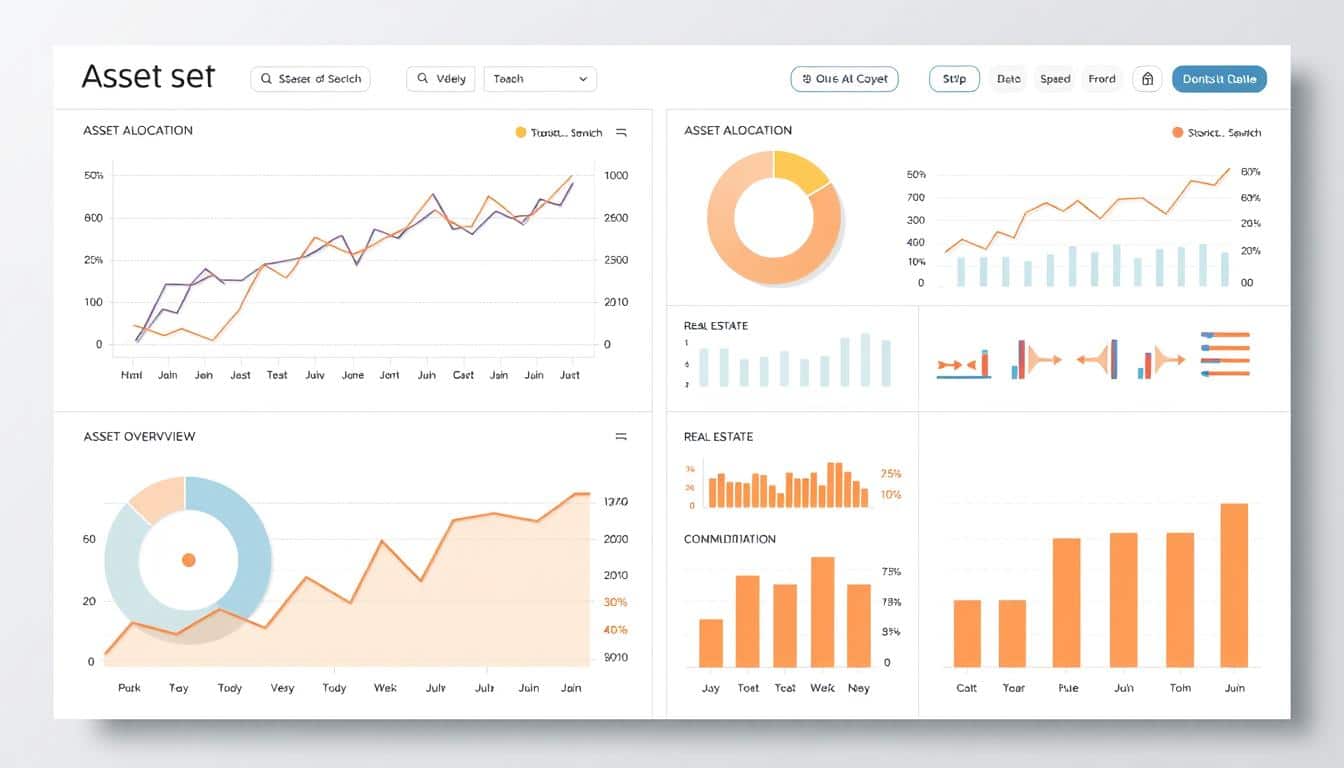In today’s ever-changing economy, smart real estate investing is key for creating wealth. It’s important for everyone to know about different real estate investment methods. These methods help people from all backgrounds, whether you’re starting out or have been investing for years.
By understanding these strategies, you can make smart choices. This will help you take advantage of what real estate offers and overcome its challenges.
Anúncios
Understanding the Basics of Real Estate Investing
Real estate investing involves various strategies to buy properties for profit. It includes rental income and capital gain. Knowing what real estate investment means is key to success.
To start with real estate, one needs to understand certain terms. Terms like cash flow, due diligence, and types of properties are important. There are different property categories like residential, commercial, and land.
Each type has its own features and challenges. Additionally, knowing about zoning laws is important. They can change how a property is used. This knowledge helps investors make smart choices and plan better strategies for the market.

Why Invest in Real Estate? The Benefits and Opportunities
Investing in real estate appeals to many for its various advantages. The main perk is the chance for steady cash flow through rentals. These properties can bring in a consistent income, helping with long-term finances.
Real estate also offers tax benefits, like depreciation and mortgage interest write-offs. These can boost profits. Plus, it’s a good shield against inflation since property values and rents usually go up.
Diving into real estate is smart because property values generally increase over time. Compared to the stock market, real estate is often more stable. This makes it a solid choice for spreading out investments.
Many see big financial wins in real estate, particularly in emerging areas. Spotting neighborhoods with potential can lead to higher property values as they develop.
Types of Real Estate Investments
Real estate investments come in four main types: residential, commercial, industrial, and land. Each type offers unique features and chances for investors. This variety helps investors make better choices.
Residential investments cover single-family homes, condos, and multifamily units. Investors in these need to handle property management and upkeep. They pay close attention to local market trends and keeping tenants happy.
Commercial properties include office spaces, stores, and malls. They often yield higher profits due to long lease terms. But, they face risks like empty spaces and market swings affecting tenant stability.
Industrial real estate is about warehouses, factories, and distribution hubs. These need less daily management because of longer leases. The rise in online shopping boosts demand for these spaces, benefiting investors.
Land investments mean buying undeveloped land for later development or resale. This approach can be riskier but offers big potential payoffs. If land values go up or development chances come, profits can be significant.
Rental Properties as a Smart Investment Solution
Investing in rental properties can be a smart move. It can lead to steady income and help you build wealth. It’s popular among both new and old investors. Many look into the pros and cons of this investment to make smart choices.
Pros and Cons of Rental Properties
Rental properties have their ups and downs. The upsides include:
- Stable money from rent.
- Tax breaks, like mortgage interest and depreciation deductions.
- The chance for the property’s value to grow, increasing profits.
However, rental properties come with challenges. The downsides are:
- Dealing with tenants and their needs.
- Unexpected money needs for repairs.
- The worry of empty properties, losing rental income.
Thinking over these points can help you see if rental properties fit your financial plans and comfort with risks.
Real Estate Investment Groups (REIGs): A Less Hands-On Approach
Real Estate Investment Groups are great for those who like passive investing. These groups mean you can own real estate without the hassle of managing it. By pooling funds, the group buys properties, and handles everything needed.
How REIGs Work
With Real Estate Investment Groups, your investment can spread out, involving less work for you. Investors purchase shares, and this money goes into buying rental properties. Everything, from dealing with tenants to maintenance, is managed by the group. This way, investors can earn from real estate without the stress of direct management.
Advantages and Disadvantages of REIGs
REIGs have several benefits for those wanting a simple way to invest in real estate:
- Access to diversified investment portfolios.
- Expert management oversees property operations.
- Potential for regular income through rental payments.
However, investing in REIGs also comes with its risks:
- High fees for management services.
- Reliance on the management team’s skills and experience.
- Less personal control over your investments compared to owning them directly.
The Allure of House Flipping
House flipping has become a well-known way to make money recently. It involves buying homes at low prices, fixing them up, and selling them for a profit, usually quickly. The key to doing well in house flipping is knowing the local housing market, how to fix up properties well, and understanding the risks. Learning the best house flipping tactics can greatly improve your chances of making a profit.
Key Strategies for Successful Flipping
To flip houses successfully, you need to follow some important steps. Here are a few tips that can help:
- Research the Market: Look into neighborhood trends, property values, and what buyers want.
- Select the Right Property: Pick homes that need simple fixes over big repairs to save on costs.
- Budget Wisely: Always plan for unexpected costs during renovation.
- Hire Qualified Contractors: Choose professionals with experience in renovating homes to ensure good work.
- Timing the Sale: Sell when the housing market is booming to make the most money.
Common Pitfalls to Avoid in House Flipping
House flipping can bring in big money, but there are risks. Knowing these common mistakes can help protect your investment:
- Market Fluctuations: Selling at the wrong time can lead to big losses. Keep an eye on market trends.
- Underestimating Renovation Costs: Not budgeting enough for fixes can reduce your profits.
- Cash Flow Challenges: Make sure you have enough money for mortgage payments while fixing up the house.
- Not Understanding Buyer Preferences: Making the house too unique might turn off potential buyers.
- Neglecting Comprehensive Inspections: Missing out on thorough inspections could reveal expensive problems after purchase, affecting profits.
Investing in Real Estate Investment Trusts (REITs)
Investing in REITs opens the door to the real estate world without the need to own properties directly. These trusts gather money from many investors to buy and look after income-generating properties. Through this, investors can earn significant REIT benefits, such as high returns from rents and sales.
REITs are great because they are easy to buy and sell on the stock market. You can quickly change your investment plan as needed. They also let you spread your investment across different types of properties. This lowers the risk of losing money on your investment.
When looking into REITs, it’s crucial to understand the difference between equity REITs and mortgage REITs. Equity REITs make money by leasing out properties they own. On the other hand, mortgage REITs earn by financing real estate. This knowledge helps match your investments with your financial goals, leading to smarter choices about investing in REITs.
Leveraging Online Real Estate Platforms for Investment
Online real estate platforms have changed how we invest in property. Now, even people with a small amount of money can join in on big commercial projects. This way, more people get a chance to invest in real estate, even if they never thought it was possible before.
Understanding Real Estate Crowdfunding
Through real estate crowdfunding, folks can pool their money together. This makes it simpler to invest in big-time properties without needing lots of cash. You can start with as little as $500 or as much as $25,000. This opens up a world of options for diversifying your investment portfolio without a huge bankroll. Some perks include:
- Ease of Access: Platforms make it easy to invest from home, making smart decisions possible for everyone.
- Geographical Diversification: You can pick projects in different places, helping to spread out the risk of market changes.
But, investing online through these platforms can have its downsides too. Before jumping in, investors should weigh these factors:
- Liquidity Risks: Getting your money back quickly might not be an option. So, patience is key when waiting for returns.
- Management Fees: The costs of managing your investment might eat into your profits. It’s important to know the details upfront.
Preparing for Economic Downturns in Real Estate Investing
Economic downturns can hit real estate markets hard. It’s key for investors to build strong risk management habits. Using smart strategies during uncertain times can protect money and improve earnings. It’s vital to have enough cash on hand for tough times.
Knowing how markets move lets investors adjust their plans. Keeping loans low compared to property values reduces risk. This offers a safety net when the economy shakes. Having different kinds of properties in various places makes portfolios stronger. It guards against drops in certain areas.
Getting ready for economic problems makes an investor more stable against ups and downs. By focusing on flexible strategies and looking ahead, investors can keep going even when the economy changes.
Optimal Market Conditions for Real Estate Investment Success
Successful real estate investing needs the right market conditions. Employment growth, higher incomes, and low-interest rates help a lot. It’s important to pick areas with good demographics and investments in infrastructure. These places usually see long-term real estate growth.
Key indicators to watch are:
- Job creation rates, showing economic health.
- Population growth, pointing to more need for homes.
- Availability of amenities and services, making areas more attractive.
To understand the real estate market, these indicators are crucial. Knowing them helps investors make smart choices. They can find the best opportunities in growing real estate markets.
Conclusion
Looking back, it’s clear that smart strategies are key in real estate investing. Making informed and educated choices is essential in this complex market. We’ve looked at options like rental properties, real estate investment groups, and REITs. Each of these offers its own benefits for different kinds of investors.
It’s important to understand the market and align choices with your financial goals. Doing research helps avoid risks and find good opportunities. Education is crucial for any investor wanting to succeed.
Being adaptable and always learning are vital in real estate investment. With the strategies we’ve talked about, you can start your real estate journey with confidence. This could lead to financial growth and success in the property market.
FAQ
What are the primary benefits of investing in real estate?
What types of properties can be included in real estate investments?
How do Real Estate Investment Groups (REIGs) operate?
What are the risks associated with house flipping?
How do Real Estate Investment Trusts (REITs) work?
What is real estate crowdfunding, and how does it benefit investors?
What strategies can be employed to mitigate risks during economic downturns?
What indicators should investors look for when assessing market conditions for real estate investment?
Conteúdo criado com auxílio de Inteligência Artificial



